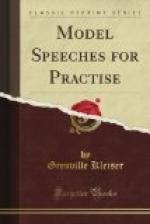I thought that I detected in the last words of your speech, in proposing this toast, Mr. President, an accent of gentle reproach that any one should desert the high and pleasant ways of literature for the turmoil and the everlasting contention of public life. I do not suppose that there has ever been a time in which there was less of divorce between literature and public life than the present time. There have been in the reign of the Queen two eminent statesmen who have thrice had the distinction of being Prime Minister, and oddly enough, one of those statesman (Lord Derby) has left behind him a most spirited version of Homer, while the other eminent statesman (William E. Gladstone)—happily still among us, still examines the legends and the significance of Homer. Then when we come to a period nearer to ourselves, and look at those gentlemen who have in the last six years filled the office of Minister for Ireland, we find that no fewer than three (George Otto Trevelyan, John Morley, and Arthur Balfour) were authors of books before they engaged in the very ticklish business of the government of men. And one of these three Ministers for Ireland embarked upon his literary career—which promised ample distinction—under the editorial auspices of another of the three. We possess in one branch of the Legislature the author of the most fascinating literary biography in our language. We possess also another writer whose range of knowledge and of intellectual interest is so great that he has written the most important book upon the American Commonwealth (James Bryce).
The first canon in literature was announced one hundred years ago by an eminent Frenchman who said that in literature it is your business to have preferences but no exclusions. In politics it appears to be our business to have very stiff and unchangeable preferences, and exclusion is one of the systematic objects of our life. In literature, according to another canon, you must have a free and open mind and it has been said: “Never be the prisoner of your own opinions.” In politics you are very lucky if you do not have the still harder fate—(and I think that the gentlemen on the President’s right hand will assent to that as readily as the gentlemen who sit on his left) of being the prisoner of other people’s opinions. Of course no one can doubt for a moment that the great achievements of




